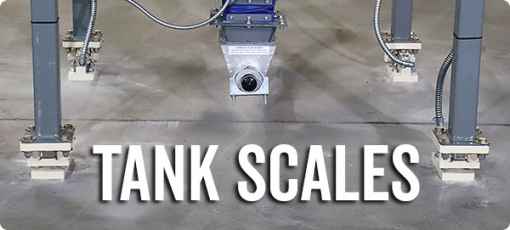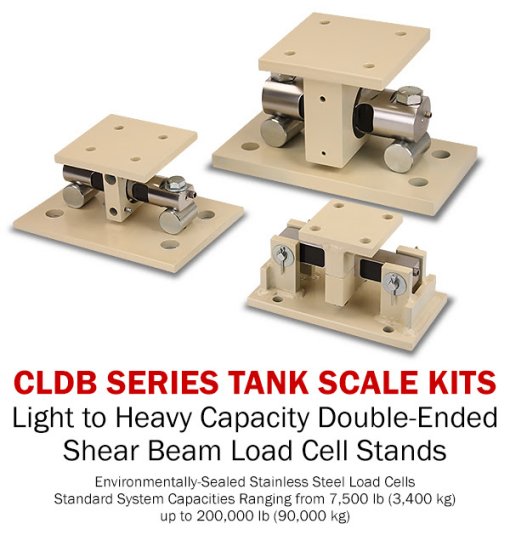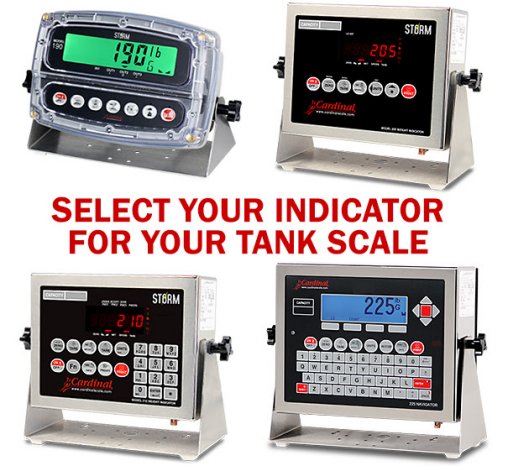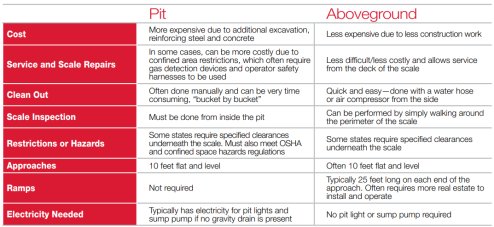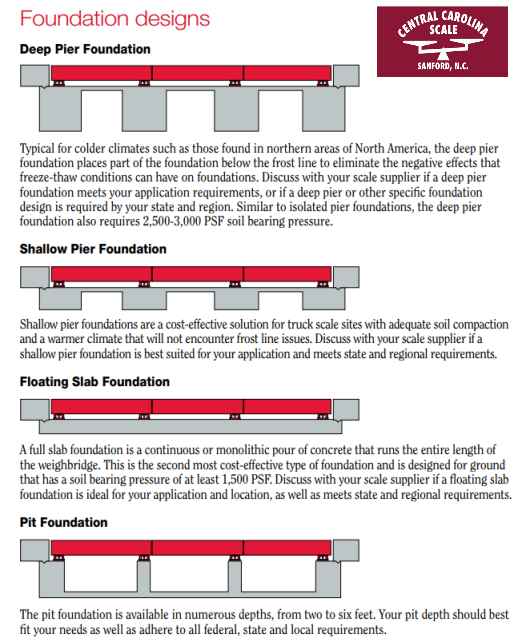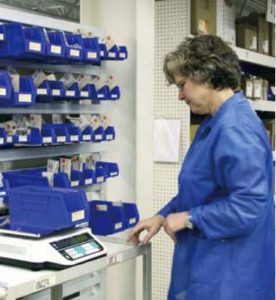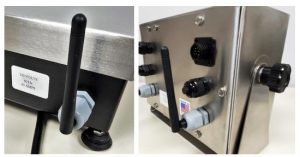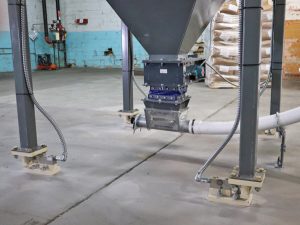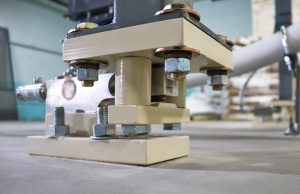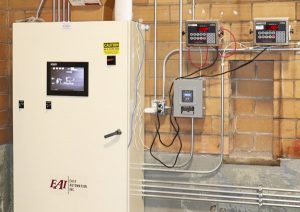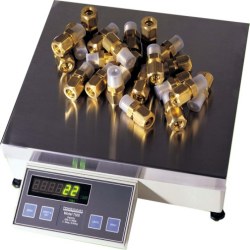Cardinal Scale Manufacturing tank mount scales come in a wide range of varieties and uses. Cardinal Scale’s load cell kits are used in a variety of industries ranging from agricultural needs to suspension hoppers in industrial to hydraulic kits that are utilized for tank and hopper weighing. All of Cardinal Scale’s load cell kits are constructed with durable, heavy-duty steel and come in groups of 3 or 4 or 6 or more load cells and stands.
The load cell kits come in electronic, digital, and hydraulic load cell varieties to fit any industrial weighing application. The overall weight capacities per load cell kit can vary greatly, ranging from just a few thousand pounds to 800,000 pounds! Cardinal Scale’s new DC Series Digital load cell kits even feature new technology that has erased much of cumbersome wiring and the junction box for easier transmission of load cell data. Cardinal Scale features load cell kits can be used in suspension, compression, and shear load cell applications for vessel weighing.
Cardinal Scale Manufacturing DB-SP CenterPoint load cell heavy-capacity mounting kits utilize the time-tested and reliably-proven model DB double-ended stainless steel load cells for mixing tanks that feature a center load design. The stands are available in either stainless steel or mild steel powder-painted industrial tan and they bolt directly to the floor and tank. The DB-SP’s environmentally-sealed load cells are NTEP, OIML, and VCAP certified for quality and accuracy. They provide superior performance in a wide range of process control and vessel weighing applications weighing tanks, bins, hoppers, silos, and mixers.
Standard system capacities range from 60,000 lb (27,000 kg) up to 300,000 lb (136,000 kg). The bolt-in-place mounting assembly with articulating top plate makes them ideal for indoor or outdoor weighing applications. Available in three or four-legged mounting assemblies, the DB-SP CenterPoint load cell kits are perfect for mixing, blending, batching, inventory control, and general weighing. Combine them with one of Cardinal’s state-of-the-art 200 series weight indicators for a complete digital weighing system.
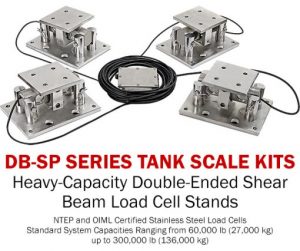
The DB-SP stands are engineered for superior serviceability and easy load cell replacement by simply applying a jack under the stand, removing the cotter pins, and swapping out the load cell. The easy load cell removal minimizes maintenance costs. The kits are ideal for new installations or conversions. Each kit, available from Central Carolina Scale, includes the mounting stands, stainless steel load cells, cables, and NEMA 4 junction box. Cardinal Scale’s load cell production facility is VCAP and ISO certified for quality and precision standards offering dependable accuracy for each and every load cell manufactured.
Cardinal’s CenterPoint Tank/Hopper Scales utilize double-ended shear beam stainless steel load cells with center load design. The bolt-in-place mounting assembly with articulating top plate makes them ideal for indoor or outdoor weighing applications.
Available in three or four legged mounting assemblies with mild or stainless steel stands and self-checking sliding pin design, the CenterPoint tank mount scales are perfect for mixing, blending, batching, inventory control, and general weighing. Combine them with one of Cardinal’s state-of-the-art weight indicators for a complete digital weighing system. Capacities range from 7,500 to 200,000 lbs.
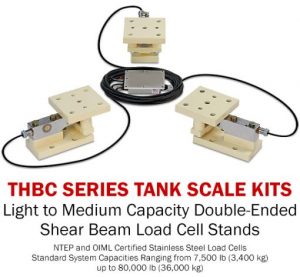
Cardinal Scale’s THBC electronic load cell kits are ideal for weighing tanks, hoppers, mixers, and conveyors. These self-checking load cell kits are available with mild steel or stainless steel stands, system capacities ranging from 7,500 lb (3,400 kg) up to 200,000 lb (90,700 kg), and stainless steel waterproof load cells.
The THBC kits are ideal for medium-to-heavy capacity tank and hopper weighing, new or existing installations, and accommodate multi-legged tanks with up to 10 legs. They offer an easy-to-install, low-profile, bolt-down design. Each kit comes complete with 3 or 4 stainless steel load cells, self-checking load cell stands, load cell cable, and a stainless steel junction box. Special self-centering load buttons protect against offset side loads.
The rugged, environmentally-sealed SB series shear beam load cells, also manufactured by Cardinal Scale, are NTEP, OIML, and VCAP certified.
Cardinal Scale Manufacturing digital weight indicators are one of the most vital pieces of equipment available in the company’s extensive product line. These valuable implements can couple with virtually any scale or weighing equipment to provide easy, digital viewing in almost any setting, indoors or outdoors. Each indicator is developed with the highest durability, data integration, and resolution in mind.
Cardinal Scale’s weight indicators service a wide range of industries, from food service and medical to industrial and agricultural weighing applications. Cardinal Scale’s indicators range from waterproof, color-changing displays to full-fledged programmable indicators that can be remotely controlled. Cardinal Scale’s indicators feature stainless steel enclosures, polycarbonate enclosures, or ABS enclosures to protect vital circuitry from the elements and in washdown applications.
These indicators can be gimbal-mounted, panel-mounted, DIN-rail mounted, or placed within unattended weight kiosks. From commercial foodservice product and patient weighing to truck or rail scale weighing, Cardinal Scale has a digital weight indicator for your weighing job.
Cardinal Scales manufactures a wide variety of tank weighing load cells used for weighing tanks, bins, hoppers, silos, and mixers. Ideal for new installations or conversions, each kit comes complete with 3 or 4 stainless steel load cells, mild or stainless steel load cell stands, load cell cable, and junction box. We have also seen some situations where customers would use stainless steel floor scales for this application.
If you’re in central NC, then we are able to install and calibrate your scales. If you’re outside of our general operating area, then an authorized Cardinal Scale dealer is likely nearby to you can assist.
There’s no need to wait on a slow boat from overseas causing months of delays when you can get tank mount scales shipped from Cardinal Scale’s factory in Webb City, MO. Please give us a call (919) 776-7737 or complete our Request a Quote form today, so we can help with your tank mount scale needs.

